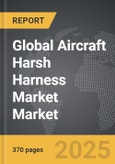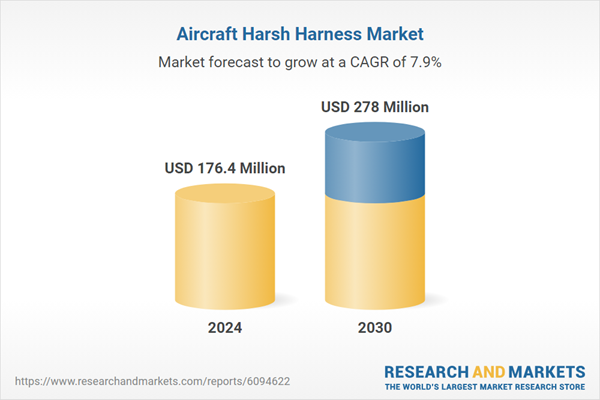Global Aircraft Harsh Harness Market - Key Trends & Drivers Summarized
Why Are Harsh Environment Wiring Harnesses Essential for Power Integrity, Signal Reliability, and Survivability in Demanding Aircraft Applications?
Aircraft harsh harnesses - specialized wiring assemblies designed to operate under extreme thermal, mechanical, chemical, and electromagnetic conditions - are critical to the integrity of onboard electrical and data systems. These harnesses route and protect power and signal lines across engines, landing gear bays, wing structures, avionics compartments, and defense mission systems, where exposure to vibration, heat, fuel, hydraulic fluids, and EMI is unavoidable.Their role is foundational in ensuring continuous operation of critical functions such as flight control systems, engine monitoring, radar, weapons systems, and cabin electronics, even under adverse conditions. As aircraft platforms become increasingly digitalized, electrified, and mission-complex, harsh harnesses provide the durability, shielding, and environmental sealing necessary to sustain performance, reliability, and safety throughout the aircraft lifecycle.
How Are Advanced Materials, EMI Shielding Technologies, and Lightweighting Objectives Shaping Harsh Harness Innovation?
Material innovation is at the forefront, with high-performance insulations such as cross-linked ETFE, PTFE, polyimide, and silicone rubber replacing traditional PVC and Teflon in harsh zones. These materials offer superior resistance to thermal cycling, fluid ingress, UV exposure, and chafing. Shielding solutions - using braided metal sheaths, foil wraps, and composite layers - are being incorporated to protect against electromagnetic interference (EMI) and ensure clean data transmission in avionics and communication circuits.Lightweighting remains a strategic priority, especially in military and commercial aviation, where every gram of reduced harness mass contributes to fuel efficiency. Manufacturers are increasingly employing composite or aluminum conductor materials in place of copper, along with optimized routing and integration to reduce cable length and bundle density. Modular, quick-connect solutions and fire-resistant jacketing also support maintenance efficiency and regulatory compliance with FAR 25.869 and MIL-SPEC standards.
Which Aircraft Systems, Program Types, and Regional Dynamics Are Driving Demand for Harsh Harnesses?
High-demand zones include propulsion systems, auxiliary power units (APUs), environmental control systems (ECS), fuel systems, landing gear, electronic warfare bays, and avionics racks. Harsh harnesses are essential across commercial airliners, military jets, rotary-wing platforms, UAVs, and next-gen electric and hybrid aircraft, where power and signal routing must remain intact under high-vibration and fluctuating pressure regimes.Military aviation leads in adoption, where survivability and battlefield reliability are paramount, especially in supersonic jets, naval aircraft, and rotary-wing attack platforms. Commercial aircraft programs - from new-generation narrow-bodies to long-range wide-bodies - are increasingly specifying harsh-rated harnesses for high-stress zones, while business jets and eVTOLs demand compact, heat-resistant wiring for power-dense electronics.
North America and Europe dominate global demand due to extensive aerospace OEM and defense ecosystems, while Asia-Pacific is rising rapidly through indigenous military development and commercial aircraft manufacturing in China, India, and Japan. The Middle East and Latin America contribute through MRO and regional fleet modernization activities, particularly in harsh-operating environments.
What Strategic Role Will Harsh Harnesses Play in Supporting Electrification, Avionics Integration, and Mission Resilience in Future Aircraft?
Harsh harnesses are poised to play an increasingly strategic role in enabling the electrical and digital backbone of future aircraft. As more systems transition from pneumatic and hydraulic to electrically actuated components, harnesses will serve as critical lifelines distributing power and data with precision, resilience, and integrity. Their ability to endure thermal, mechanical, and electromagnetic extremes will be crucial in supporting electrified propulsion, autonomous flight control, and high-bandwidth data systems.Looking ahead, smart harnesses with embedded sensors for real-time fault detection, load monitoring, and predictive maintenance will integrate into digital twin and health monitoring architectures. Could aircraft harsh harness systems become the silent, shielded infrastructure powering the next generation of electric, connected, and combat-ready aerospace platforms?
Report Scope
The report analyzes the Aircraft Harsh Harness market, presented in terms of market value (US$). The analysis covers the key segments and geographic regions outlined below:- Segments: Platform Type (Commercial Aircraft Platform, Military Aircraft Platform, General Aviation Platform, Regional Aircraft Platform, Helicopter Platform); Application (Engine Application, Wings Application, Landing Gears Application); End-Use (Original Equipment Manufacturer End-Use, Aftermarket End-Use).
- Geographic Regions/Countries: World; United States; Canada; Japan; China; Europe (France; Germany; Italy; United Kingdom; Spain; Russia; and Rest of Europe); Asia-Pacific (Australia; India; South Korea; and Rest of Asia-Pacific); Latin America (Argentina; Brazil; Mexico; and Rest of Latin America); Middle East (Iran; Israel; Saudi Arabia; United Arab Emirates; and Rest of Middle East); and Africa.
Key Insights:
- Market Growth: Understand the significant growth trajectory of the Commercial Aircraft Platform segment, which is expected to reach US$95.4 Million by 2030 with a CAGR of a 7.8%. The Military Aircraft Platform segment is also set to grow at 9.3% CAGR over the analysis period.
- Regional Analysis: Gain insights into the U.S. market, valued at $48.1 Million in 2024, and China, forecasted to grow at an impressive 12.2% CAGR to reach $59.2 Million by 2030. Discover growth trends in other key regions, including Japan, Canada, Germany, and the Asia-Pacific.
Why You Should Buy This Report:
- Detailed Market Analysis: Access a thorough analysis of the Global Aircraft Harsh Harness Market, covering all major geographic regions and market segments.
- Competitive Insights: Get an overview of the competitive landscape, including the market presence of major players across different geographies.
- Future Trends and Drivers: Understand the key trends and drivers shaping the future of the Global Aircraft Harsh Harness Market.
- Actionable Insights: Benefit from actionable insights that can help you identify new revenue opportunities and make strategic business decisions.
Key Questions Answered:
- How is the Global Aircraft Harsh Harness Market expected to evolve by 2030?
- What are the main drivers and restraints affecting the market?
- Which market segments will grow the most over the forecast period?
- How will market shares for different regions and segments change by 2030?
- Who are the leading players in the market, and what are their prospects?
Report Features:
- Comprehensive Market Data: Independent analysis of annual sales and market forecasts in US$ Million from 2024 to 2030.
- In-Depth Regional Analysis: Detailed insights into key markets, including the U.S., China, Japan, Canada, Europe, Asia-Pacific, Latin America, Middle East, and Africa.
- Company Profiles: Coverage of players such as Aero Tec Laboratories, Inc., Amfuel, ATL (Aero Tec Laboratories), ContiTech AG, Cobham Mission Systems and more.
- Complimentary Updates: Receive free report updates for one year to keep you informed of the latest market developments.
Some of the 34 companies featured in this Aircraft Harsh Harness market report include:
- Amphenol Corporation
- Carlisle Companies Inc.
- Co-Operative Industries
- Ducommun Incorporated
- GKN Aerospace
- Glenair Inc.
- HarcoSemco LLC
- IMP Group
- Interconnect Wiring
- kSARIA Corporation
- Latecoere SA
- Miracle Aerospace
- Safran SA
- Shenyang Aircraft Corporation
- SteinAir Inc.
- TE Connectivity Ltd.
- TT Electronics
- Ultra Electronics Holdings Limited
- Unison Industries
- Ventura Aerospace
This edition integrates the latest global trade and economic shifts into comprehensive market analysis. Key updates include:
- Tariff and Trade Impact: Insights into global tariff negotiations across 180+ countries, with analysis of supply chain turbulence, sourcing disruptions, and geographic realignment. Special focus on 2025 as a pivotal year for trade tensions, including updated perspectives on the Trump-era tariffs.
- Adjusted Forecasts and Analytics: Revised global and regional market forecasts through 2030, incorporating tariff effects, economic uncertainty, and structural changes in globalization. Includes historical analysis from 2015 to 2023.
- Strategic Market Dynamics: Evaluation of revised market prospects, regional outlooks, and key economic indicators such as population and urbanization trends.
- Innovation & Technology Trends: Latest developments in product and process innovation, emerging technologies, and key industry drivers shaping the competitive landscape.
- Competitive Intelligence: Updated global market share estimates for 2025, competitive positioning of major players (Strong/Active/Niche/Trivial), and refined focus on leading global brands and core players.
- Expert Insight & Commentary: Strategic analysis from economists, trade experts, and domain specialists to contextualize market shifts and identify emerging opportunities.
Table of Contents
Companies Mentioned (Partial List)
A selection of companies mentioned in this report includes, but is not limited to:
- Amphenol Corporation
- Carlisle Companies Inc.
- Co-Operative Industries
- Ducommun Incorporated
- GKN Aerospace
- Glenair Inc.
- HarcoSemco LLC
- IMP Group
- Interconnect Wiring
- kSARIA Corporation
- Latecoere SA
- Miracle Aerospace
- Safran SA
- Shenyang Aircraft Corporation
- SteinAir Inc.
- TE Connectivity Ltd.
- TT Electronics
- Ultra Electronics Holdings Limited
- Unison Industries
- Ventura Aerospace
Table Information
| Report Attribute | Details |
|---|---|
| No. of Pages | 370 |
| Published | February 2026 |
| Forecast Period | 2024 - 2030 |
| Estimated Market Value ( USD | $ 176.4 Million |
| Forecasted Market Value ( USD | $ 278 Million |
| Compound Annual Growth Rate | 7.9% |
| Regions Covered | Global |









